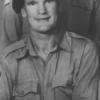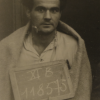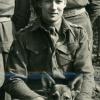Francis was born and brought up in Dartmouth in Devon. His grandfather and great-grandfathers had all been seafarers, his father a signaller in the Royal Navy. It was an idyllic childhood – he messed about in boats, picked primroses and violets in the hedgerows with his mum and aunties, and spent long summer days playing in the countryside with his friends. He climbed (and dangled from!) Dartmouth castle ramparts, fell in the harbour and had to be fished out, and generally had a carefree and adventurous boyhood.
When the war broke out life changed dramatically in the sleepy harbour town and Francis, too young at that point to go to war, became a member of the Home Guard. In September 1942, when he was at work down by Dartmouth harbour a German bomber swooped low over the town and attacked Phillip's boatyard across the river. Francis took a shot at it with his Home Guard rifle, but the plane went on to bomb the yard, killing 20 workers, including one of his uncles.
Francis broke with the family seafaring tradition and joined the Army enlisting into The Devonshire Regiment. When he was 19 he volunteered for airborne forces and over the next three years he was to have experiences that impacted his life in lasting ways, including several ‘narrow escapes’.
After completing his parachute training in May 1943 he sailed to Algiers. Not long after arriving his brigade was told it was going to Sicily, where its task would be to capture the Augusta Bridge. On 10 July they were lying at the ready on the airfield at Sousse, waiting to board their plane for the operation which was postponed until the following day. Francis found that sleeping wasn’t as difficult as it sounded, lying on the ground in his full kit – as his parachute acted a bit like a mattress. But he had so much kit – many grenades, his ‘Bren gun’ and a bandolier of ammunition - that it felt as though someone would have had to lift him on board when the time came!
Airborne casualties in the Sicily campaign were huge, but Francis’ unit’s mission was finally cancelled half an hour before they were to board the plane in Sousse, as 13 Corps had managed to secure the objectives themselves.
Later, in September 1943, his unit went by ship to Taranto and took part in the seaborne invasion of Italy,subsequently spending many months moving through the Apennines. In the winter there was so much mud that they had to give up on vehicles altogether and use mules to get supplies up and down the line. Every second night someone would take the mules back to HQ and collect the unit’s food for the next two days. Francis remembered how on one occasion the cook loaded all the food onto a mule, which then bolted - and they lost the lot!
On another occasion, near Monte Cassino, Francis decided, quite randomly, to move his tent - and the next day an enemy shell landed in the exact spot where it had been.
One day, in the summer, they were taken by lorry to the west cost of Italy, to Salerno, which Francis felt at the time was like heaven compared to their mountain existence - except that Vesuvius had erupted just before they arrived and there was dust everywhere. They proceeded to Rome and then some of the unit deployed to Southern France for Operation Dragoon, but Francis was flown to an airstrip in Greece.
In Greece they entered Athens in open lorries to streets full of thousands of cheering people, and set up camp in a deserted French school, at Liondia. It was here that a local Greek family came to the unit one day and offered hospitality to the soldiers (even though the Greeks were quite short of food) – they were so grateful for their liberation. Two soldiers were invited to their home for a meal – and Francis was one of them. He remained in close contact with the family and would phone them every Christmas Day. In the 1970s he and his wife went to Athens for a holiday, and met up once more with surviving members of that same Greek family.
From Athens Francis went up the Aegean to Brindisi and thence to Rome. However, in December 1944, he was sent back to Athens onboard the HMCS ‘Prince David’, a converted cruiser of the Royal Canadian Navy operating as an Infantry Landing Ship, to fight the ELAS guerillas. Although the ship, laden with over 300 troops and ammunition, was hit by a mine which opened up a 17 ft by 12 ft hole below the waterline, it managed to make it into Salamis Bay.
The only part Of Athens that was ‘free’ by then was the very centre, where Toc H supplied hot jam doughnuts for the men, and it was there that Francis saw his old French teacher from school, (who was 10 years or so older than him, and in the Intelligence Corps), sitting at another table. They had an emotional reunion. (When Francis was telling me about this he quite suddenly shed a few tears – the emotion flooded back and was very vivid - of meeting someone familiar, someone from home, after such a long time in strange and dangerous circumstances. He remembered being quite overwhelmed at the time.)
One day, shells came down in Stadia Street, fired by the guerrillas. One landed alongside a place selling cigarettes and killed three Greek policemen. A second shell landed 10 feet from where Francis lay sheltering in the gutter, but it failed to explode.
A couple of British soldiers were wounded and Francis and his companions dragged them back across the street and got them to the hospital.
Francis carried a camera with him for most of the war, which he would stuff down the front of his shirt. He took some good photos of jumps, but on his 8th jump when he wanted to get a good shot of the 16 men coming out of the plane behind him he found himself facing the wrong way. He made several attempts to twist around to get sight of them, but had to give up and stuff the camera down his front quickly, as he suddenly realised he was getting too near the ground.
The 2nd Parachute Brigade returned to Italy in January 1945 and one day, while on training, Francis found he had no breath and couldn’t run. He was sent for an X-ray and found to have pneumonia. He spent the next 4 months in hospital in Foggia.
The rest of his unit returned home to the UK and after 4 months in hospital the war ended, and he remembered that a nurse came in and brought the remaining patients half a pint of beer each to celebrate. Francis said, ‘Can I go home now?’ The nurse took his temperature, ‘Yes’, she said quietly, ‘you can go home’.
However, Francis was to spend one last year with the Paras in Palestine, guarding prisoners, and ‘watching the Jewish people coming home right, left and centre’, before being demobbed and at last returning home.
By Cara Grant (daughter of Francis Wood)
Read More




Latest Comments
There are currently no comments for this content.
Add Comment
In order to add comments you must be registered with ParaData.
If you are currently a ParaData member please login.
If you are not currently a ParaData member but wish to get involved please register.